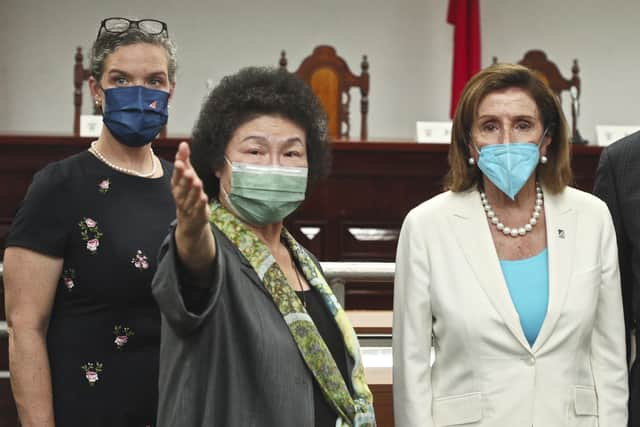US-China tensions: Lessons learned and consistency key in West's policy on Taiwan
It has been bubbling in the background for a while, but it would appear tensions are set to hit boiling point between China and the West over US House Speaker Nancy Pelosi visiting Taiwan.
China has long viewed Taiwan – an independent entity with its own elected leaders, armed forces and constitution – as its own national territory.
Advertisement
Hide AdAdvertisement
Hide AdWhen Chiang Kai-shek fled to Taiwan after defeat to communist leader Mao Zedong, effectively two Chinese leaders existed – but upon his death, martial law was ended in Taiwan and it shifted towards a functioning democracy.


Its position, and open market values, has resulted in a booming economy and has coincided with China stepping up efforts to claim Taiwan as its own once again.
China’s President Xi Jinping stated last year that "reunification" with Taiwan "must be fulfilled” – putting unification at the heart of his ''One China” policy.
Such a move would also give China a prized strategic and economic asset – and it is perhaps such a heightening of stakes that has seen the US step up diplomatic action with President Joe Biden courting Beijing’s wrath with a sanctioned visit to Taiwan from Ms Pelosi.
In a visit she said: “America’s determination to preserve democracy, here in Taiwan and around the world, remains ironclad.”
The move did not go down well – and has resulted in the announcement of the largest military exercise seen from China aimed at Taiwan since 1995, with Chinese military encroaching on Taiwan following the visit.
Chinese vice foreign minister Xie Feng summoned the US ambassador in Beijing, Nicholas Burns, to convey the country’s protests the same night.
Taiwan decried the planned actions, saying they violated the island’s sovereignty, which in the eyes of China does not exist.
Advertisement
Hide AdAdvertisement
Hide AdIf you are thinking this is mirroring scenes from a certain ongoing Russian ‘military operation’ in Europe at the moment, then you may be correct. Already those sympathetic to China have branded the move from the US as ‘poking the dragon in the eye’.
There has been strong talk from Tory leadership hopefuls Liz Truss and Rishi Sunak on China in recent debates, but at the same time the US is planning to roll back tariffs on Chinese goods. In 2015 the UK signed a £40 billion deal with China – and declared itself as its ‘best partner in the West’ before becoming its harshest critic in blocking Huawei a few years later.
At a time when President Xi is looking to secure his third term as the Chinese Communist Party, the West is also facing a number of uncertainties.
For decades, the West has been sending out contradictory signals on China and Taiwan, leaving it adrift and confused.
More must be done to ensure cohesion on the situation. Lessons need to be learned from history and current events in Europe to ensure the safety of the people is put above political and economic interests.
Comments
Want to join the conversation? Please or to comment on this article.
